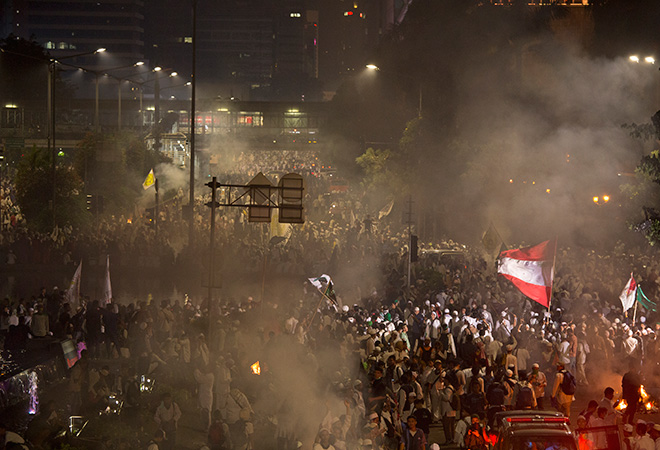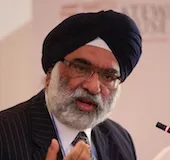
In recent years there appears to be a growing sensitivity to issues related to Islamic causes in Indonesian foreign policy. As the world’s largest Muslim country, it has a tradition of syncretic Islam under the founding ideology of Pancasila. However, the Indonesian approach to issues has started to show a preference to associate Islam to issues that it did not perhaps so link earlier. While the policy is surely based on its national interest and its priorities, it is worth exploring if the Islamic tinge is appearing in these options.
On 28 February 2020, the Indian Ambassador was summoned by the Indonesian Foreign Minister to ostensibly discuss the riots in Delhi. <1> This was preceded by a statement by the Religious Affairs Minister along with Nahdlatul Ulama (NU) and Muhammadiyah, the two largest Muslim CSOs. This was quite unprecedented. Riots have occurred in India before but the Ambassador has not been summoned for these issues. Indonesia conveyed the concerns of society on the riots. A few days later there were aggressive demonstrations at the Indian Embassy in Jakarta and the consulate in Medan. These expanded to include the issue of Kashmir amongst others. These again were strange happenings in Indonesia. In 2015, Gita Wirjawan had said “the potential threat from a small band of home-grown extremists” and the “growing popularity of conservative and puritan Islam” makes it all the more imperative for India and Indonesia to collaborate. This idea needs to be furthered with a resumption of the interfaith dialogue in which both India and Indonesia had agreed to encourage the soft power of religion in preventing instrumentalisation of religion and religiously motivated violence.
The Indonesian approach to issues has started to show a preference to associate Islam to issues that it did not perhaps so link earlier.
There are manifestations of new positions being taken by the Indonesian government. The position of Indonesia vis-a-vis the Organisation of Islamic Cooperation (OIC) and Palestine is one such aspect. The intra-ASEAN focus on the Rohingya issue in Myanmar is another. The rather quiet response to China’s treatment of the Uighurs and the more vocal reaction to incidents in India this year show some aspects that need scrutiny.
4 November 2016 is a watershed moment with regard to the Islamic emphasis in Indonesia. 500,000 people marched into Jakarta in the largest religious demonstration in the country. The ostensible purpose was to challenge the then Christian Jakarta Governor, Ahok, on blasphemy charges. He had been President Joko Widodo’s (Jokowi) deputy in Jakarta and was fighting the next election for the position. The large demonstrations and smaller offshoots stalled his chances and ultimately sent him to a 2-year jail term while his mentor continued as President. The demonstration brought the power of Indonesian Muslims to the fore. The Islamic Defenders Front (FPI), led by Rizieq Shihab, was the vanguard. This perturbed the government, which vacillated between challenging them, ignoring them or as General Prabowo advised the President, to coopt them. At the next demonstration on 2 December, Jokowi went out and joined the prayers with the demonstrators. The margin between demonstrator and government considerably thinned.
4 November 2016 is a watershed moment with regard to the Islamic emphasis in Indonesia. 500,000 people marched into Jakarta in the largest religious demonstration in the country.
The rise of the new groups had hustled Jokowi into coopting the NU and the MUI (Indonesia Ulema Council) by inviting its leader Ma’ruf Amin to be his Vice President. This altered Indonesian politics and showed new contours that were developing rapidly.
The OIC
Since President Widodo (Jokowi) came to power in 2014, OIC summits were held in Turkey (2016) and in Saudi Arabia (2019). Jokowi attended neither. He, however, hosted the 5th Extraordinary OIC Summit on Palestine in March 2016 and participated in the next such meeting in Turkey in December 2017.
Jokowi’s interest in the OIC is the Palestinian cause. Indonesia takes Palestine, not the OIC, very seriously. This predates Jokowi’s rise. Indonesia believes that Palestine was among the earliest to play a role in providing de jure recognition for it while fighting the Dutch for independence in 1945-46. The Palestinian Mufti Sheik Muhammad Amin al-Husaini, the Grand Mufti of Palestine and Supreme Leader of the Council of Palestine, is credited with raising support of Egypt, Lebanon and others. Since Soekarno, Indonesia has been keenly interested in the issue. But no one took the step of hosting an OIC summit on Palestine that Jokowi did. This was preferred over other avenues like a Non-Aligned Movement (NAM) initiative or an Afro-Asian initiative since Indonesia and South Africa were co-chairing the New Asian-African Strategic Partnership (NAASP) to follow up the Bandung processes.
Jokowi has linked the issue of Palestine, which is an Indonesian pledge to the Islamic angle and started to play a role within the OIC.
Thus, Jokowi has linked the issue of Palestine, which is an Indonesian pledge to the Islamic angle and started to play a role within the OIC. This covers two constituencies, the legacy issue of Palestine and the more vocal Muslim identity.
The Rohingya issue
The Rohingya issue, meanwhile, is a test case. There is no doubt that Indonesia has a fear of refugees arriving in the sensitive Aceh province. Since the 2017 military action in Rakhine, the view is also that the issue impinges on ASEAN principles. Indonesia sees its role as unique in ‘investing in peace.’ It has supported ASEAN to do more in Myanmar and routed grants for returning displaced people through ASEAN. The OIC has not been used by Indonesia for this issue. ASEAN, in the main, has stuck with Myanmar’s view. Indonesia stepped out of the bounds of ASEAN policy and engaged Myanmar and Bangladesh to alleviate the suffering of the Rohingyas, including building a hospital. Certainly there were humanitarian and security issues, but the pressure of domestic Muslim groups was clearly felt after 2016. The large rallies that were allowed at the Myanmar Embassy in 2017 were an indicator of this new approach. Unlike the past, when Indonesia stayed with humanitarian concern, in 2017, Jokowi himself made public statements on the Rohingya plight and sent Foreign Minister Retno Marsudi on diplomatic journeys across the region. His preemptive action was to alleviate pressure from the Muslim core which had become forceful since November 2016.
Certainly there were humanitarian and security issues, but the pressure of domestic Muslim groups was clearly felt after 2016.
The notable point is that Indonesia could not move ASEAN to take concerted moves on the Rohingyas. This was attached to their Muslim rather than the ASEAN identity. Most of my Indonesian interlocutors deny these are Muslim issues. From the outside, the greater attention due to domestic pressure to do more with Muslim related issues through foreign policy is better perceived.
A new axis of Islam and policy is emerging in Indonesia after Jokowi’s election for the second time in 2019. Jokowi chose not to crack down but embrace the Muslim organisations. He invited his rival candidate, Prabowo, into the Cabinet and Muhammadiyah leader Din Shamsuddin to be Special Envoy for Interfaith Dialogue. They had performed well at the polls in major Muslim provinces of West Java and Aceh.
The notable point is that Indonesia could not move ASEAN to take concerted moves on the Rohingyas. This was attached to their Muslim rather than the ASEAN identity.
The coopting of the NU, Muhammadiyah and the MUI, and having a cleric as the Vice President has not yet tamed the FPI and its offshoots such as the PA 212 who still have the ability to voice Muslim concerns. They brought Muslim voices into the streets beyond the traditional Muslim CSOs who now stand firmly coopted. The Muslim prism on domestic issues has started to show its tinge in the country’s foreign policy due to these voices. Since the restoration of democracy in 1999, various voices have emerged from hibernation. New pro-democracy voices emerged and slowly the Muslim voices are being better heard. <2> Indonesia maintains its policy of non-interference in internal affairs of other countries, but is now nudging them to be more responsive to humanitarian issues — particularly if Muslims are involved. Indonesian interlocutors do not see the tinge of Islamic issues now affecting Indonesian foreign policy. They prefer to see the position as a moderate Indonesia standing up for Muslims post 9/11. And therein lie the contradictions.
<1> The official line from both sides is that the meeting was not about the riots in Delhi. The timing of the calling in of the Ambassador was however telling.
<2> Dewi Fortuna Anwar: Values in Indonesian Foreign policy in Edited by Krishnan Srinivasan, James Mayall and Sanjay Pulipaka Values in Foreign Policy; Rowman and Littlefield 2019 Pg 185
The views expressed above belong to the author(s). ORF research and analyses now available on Telegram! Click here to access our curated content — blogs, longforms and interviews.




 PREV
PREV


